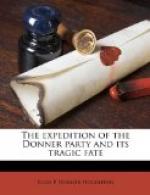Some declared him crazy, others called him a monster. Keseberg denied these charges and repeatedly accused Fallon and his party of making false statements. He sadly acknowledged that he had used human flesh to keep himself from starving, but swore that he was guiltless of taking human life. He stated that Mrs. Murphy had died of starvation soon after the departure of the “Third Relief,” and that my mother had watched by father’s bedside until he died. After preparing his body for burial, she had started out on the trail to go to her children. In attempting to cross the distance from her camp to his, she had strayed and wandered about far into the night, and finally reached his cabin wet, shivering, and grief-stricken, yet determined to push onward. She had brought nothing with her, but told him where to find money to take to her children in the event of her not reaching them. He stated that he offered her food, which she refused. He then attempted to persuade her to wait until morning, and while they were talking, she sank upon the floor completely exhausted, and he covered her with blankets and made a fire to warm her. In the morning he found her cold in death.
Keseberg’s vehement and steadfast denial of the crimes of which he stood accused saved him from personal violence, but not from suspicion and ill-will. Women shunned him, and children stoned him as he walked about the fort. The California Star printed in full the account of the Fallon party, and blood-curdling editorials increased public sentiment against Keseberg, stamping him with the mark of Cain, and closing the door of every home against him.[14]
Elitha and Leanna tried to keep us little ones in ignorance of the report that our father’s body was mutilated, also of what was said about the alleged murder of our mother. Still we did hear fragments of conversations which greatly disturbed us, and our sisters found it difficult to answer some of our questions.
Meanwhile, more disappointments for us were brewing at the fort. Fallon’s party demanded an immediate settlement of its claim. It had gone up the mountains under promise that its members should have not only a per diem as rescuers, but also one half of all the property that they might bring to the settlement, and they had brought valuable packs from the camps of the Donners. Captain Fallon also had two hundred and twenty-five dollars in gold coin taken from concealment on Keseberg’s person, and two hundred and seventy-five dollars additional taken from a cache that Keseberg had disclosed after the Captain had partially strangled him, and otherwise brutally treated him, to extort information of hidden treasure.
Keseberg did not deny that this money belonged to the Donners, but asserted that it was his intention and desire to take it to the Donner children himself as he had promised their mother.
Eventually, it was agreed that the Donner properties should be sold at auction, and that “one half of the proceeds should be handed over to Captain Fallon to satisfy the claims of his party, and the other half should be put into the hands of a guardian for the support of the Donner children.” Hiram Miller was appointed guardian by Alcalde Sinclair.




